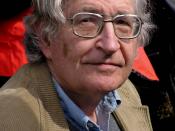The article Debt, Drugs and Democracy: An interview with Noam Chomsky, expresses ChomskyÃÂs opinions and views on the issues of the Third World, debt and world wide financial institutions such as the International Monetary Fund (IMF) and the World Bank. He also communicates his discontent with the processes of democracy, and the privatization of many national industries. The following paper will address ChomskyÃÂs views on these issues and will review his arguments based on class lectures and readings. Concepts such as the ones that Chomsky addresses in his article are ones that are essential to the Third World and cannot go unnoticed and unaddressed.
Chomsky begins the interview by stating that ÃÂ... debt is not an economic problem. ItÃÂs political.ÃÂ (Mendonca, 1999, p.24). By this he was referring to the responsibility that Third World governments should have towards paying back foreign loans. He refers to the idea that peasants and labourers in Third World countries should not have to pay back the loans that their governments decided to take and which therefore thrust their countries into debt.
He states that the people are not responsible for the debt because they are not the ones who took them out in the first place and they are not seeing any benefits from taking out these loans. This has been further supported in the writings by Speth (1999). Speth (1999) suggested that developmental aid to Third World countries must ÃÂcorrect the chronic underinvestment in social programs by poor countries with unshoulderable debt burdens,ÃÂ (p. 14). This suggests that in a way governments have no other option but using their people to pay off foreign debt. ÃÂAfrican countries are now transferring four times more money to international creditors than they spend on basic health care and education (Speth, 1999, p. 14).
When it comes...



Debt
The major problem in the world are bankers. They control currency flow and have a lot of power. Developing nations need to find the way to avoid getting into debt. They need to regulate their population growth and keep their finances balanced.
Nicely written!
0 out of 0 people found this comment useful.